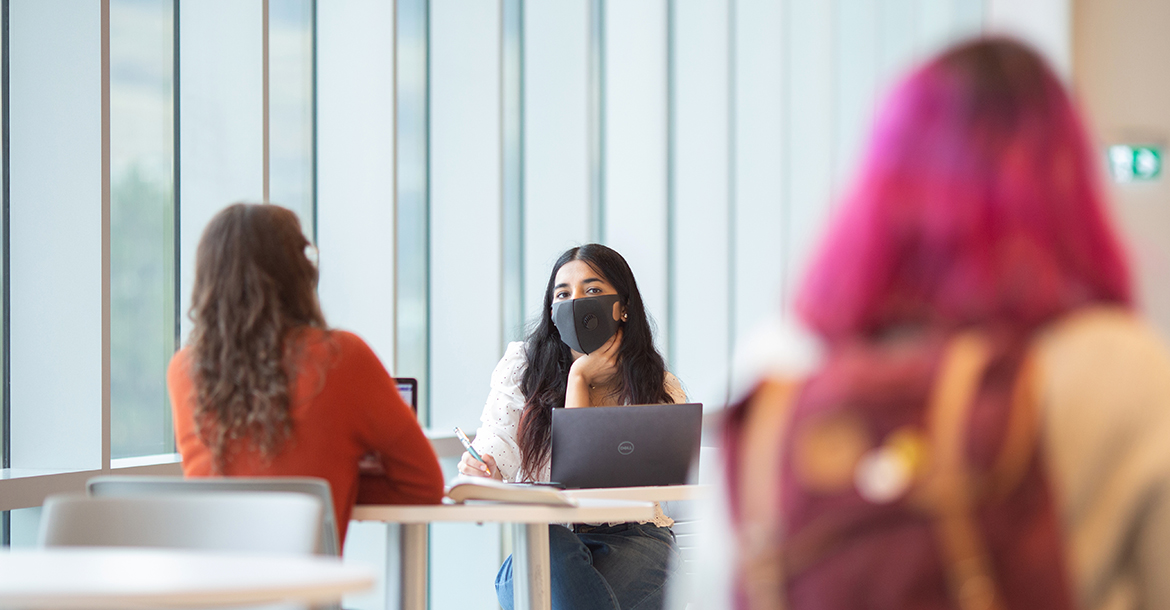
We’ve all been there, the night before a big exam and you’re up until 4 a.m. studying. While that might be unavoidable every once in a while, UBCO’s study skills experts have weighed in to say there’s a better way. Here are five tips to improve your study habits so you can skip the all-nighters.
Prioritize your exams
A couple weeks before your exams, make a list of each class’ exams, their dates, and their anticipated difficulty levels. Arrange them to prioritize your closest exams, and your hardest exams.
Be realistic with yourself — If you’ve missed five classes of Psychology, you’ll need more time to study for it than you will for the Canadian Literature class you love.
Make sure you attend the last couple of classes before your exam, especially if you’ve missed a lesson or two. In these classes, your professors will likely go over the content of the exam, so you know what you should study.
Change up your study methods
There are lots of different methods of studying, so find the one that works best for you. You might already be familiar with tips like making flashcards, recording yourself reciting your notes and listening to the recordings. However, studies show that the best way to actually learn concepts is to analyze and apply information instead of just memorizing things by connecting concepts.
Try to connect ideas by making a mind map to organize concepts by how they fit together. We also learn better when we have to explain things to other people, so study as if you have to teach the information to someone else. If you’ve got a friend, sibling, or even an interested cat who has some extra time, try to teach them the concepts (bonus if you do this without looking at your notes). Make sure to use the 5 W’s (who, what, when, where, and why) to review important details.
Don’t be afraid to try new things, especially when you’re struggling to focus. You can always reach out to the Learning Strategist for ideas and suggestions to build on your own personal learning strengths and preferences.
Study environment is another big factor of concentration. If your sister screams every time she fails a level of Super Mario Bros, you might want to make sure there is a wall or two between her and your study space.
A change of locale can be as little as moving from your kitchen table to your desk, or as big as getting out and finding a quiet cafe or park to work.
Focus on YOU
Prioritize your needs before others’. This doesn’t mean you should bail out of all your chores, but if your second-cousin asks you to help them paint their new house, you are allowed to say no.
And definitely say no if your friend asks you to go to a new club the night before your exam. (That club will still be there when you’re ready to celebrate your awesome exam grades!)
Part of focusing on your studies also means not fixating on others’ studies. Try not to compare your grades to your classmates’. If you’re wondering how your grades compare with the rest of the class, talk to your professor — in addition to telling you how you’re doing, they might give you some tips to tailor your study skills to that specific course.
Study snacks are your new best friend
Never study on an empty stomach. You need lots of energy to power that big brain. You can keep it simple (can’t go wrong with veggies and hummus), or you can try something new (like these jazzy popcorn seasonings).
Don’t skip breakfast on the day of your exam. If you’re worried about being late, try these recipes for overnight oats. You can make them the night before your exam to have a healthy breakfast waiting for you in the morning!
More snack ideas: 4 Exam Season Snack Ideas
Self-care is key
Your brain is kind of an important part of studying, right? So quit overworking it to the point of mental exhaustion.
It’s tempting to keep working through your mental fatigue, but you’re not going to be doing productive work. Taking study breaks is just as important as the studying itself.
Productive study breaks can actually enhance your brain’s capacity to learn. Being active is a great way to refresh your mind and body—bonus points if you get outside and soak up some vitamin D while you’re at it.
Another productive study break could include a nap. You read that right—sleep is a big part of self-care that students often overlook, so if you’re missing out on a full night’s sleep, use your study break to take a 20-minute power-nap (or a longer one, we won’t judge).
Don’t let studying mess up your daily routine. Sometimes it may feel pointless to have a shower if you’re going to stay home and study all day, but after three days of putting it off, you’ll be surprised by how motivated you feel when you’re clean.
We know final exams can be a major source of stress, but try to relax and remember: you’ve survived exams before, and you’ll survive them again. With a little advance planning and remembering to focus on your wellbeing first, you’ll be ready to take this exam season in stride.
If exam season has you stressed out, it can be helpful to talk to somebody. Try reaching out to the Student Assistance Program, UBC’s free 24/7 wellness resource for students to talk to a counsellor or other expert about topics ranging from academic stress to finances to personal relationships.
If you want to improve your learning skills at any time of year, the Student Learning Hub has lots of resources, to help you set, evaluate, and achieve your academic goals. Make sure you access these supports early and often to get the most benefit!